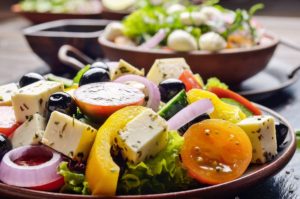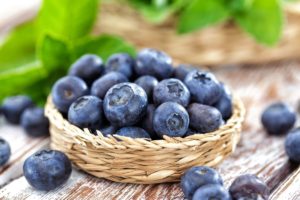Fibromyalgia Diet – How to Ease the Pain with Proper Nutrition
Muscle pain, fatigue, stiffness, and anxiety are all symptoms of Fibromyalgia. What is the best fibromyalgia diet? Do some foods really help ease the pain of fibromyalgia? What is the best treatment for fibromyalgia?
While there is no cure for the chronic illness yet, experts have found a variety of treatments and lifestyle changes that may help ease the pain. If adjusting your fibromyalgia diet and lifestyle could result in less pain and more energy, why not give the following tips a try? In this article, Evexia Family Chiropractic gives dietary tips for people struggling with fibromyalgia pain.
Tips for Choosing Food on a Fibromyalgia Diet

keeping food diary for fibromyalgia
Even though dietary restrictions and changes are not a part of the standard treatment of fibromyalgia, avoiding certain types of food and practicing healthy lifestyle habits can help patients better manage the symptoms. Remember, what works for one person may not necessarily work for the next. To figure out the right fibromyalgia diet for you, try the elimination strategy.
Elimination Diet
If a food seems to trigger symptoms, eliminate that food for a few weeks to see if the symptoms go away. You could also start out by avoiding broad categories of food that are widely known to spike the symptoms of fibromyalgia. Wheat, corn, sugar, and dairy are common problem food categories.
Before you begin your elimination diet, make sure you invest in a food journal or food logging app. Food diaries can help you keep track of the foods you’re trying to avoid along with tracking your symptoms after you quit eating different foods. Give the diet at least five days before you start to add foods back into your fibromyalgia diet.
Mediterranean Diet

Mediterranean diet and fibromyalgia
The Mediterranean diet is often said to be one of the most healthy ways of eating. Could the Mediterranean diet be the best fibromyalgia diet? What exactly is a Mediterranean diet? Unlike other diets, the Mediterranean is a variety of different foods. There are a few basic rules when it comes to the different versions of the Mediterranean diet including:
- High consumption of fresh vegetables, whole grains, seeds, nuts, fruits, and olive oil.
- Medium consumption of poultry and fish.
- Low consumption of red meat, dairy, and alcohol.
Research on the Mediterranean diet has shown so many benefits. Particularly, because the Mediterranean diet is an anti-inflammatory diet, pain associated with chronic illnesses like fibromyalgia is reduced when following the guidelines of the diet.
Fibromyalgia Diet – Foods to Avoid
If following a certain diet does not sound appealing to you, Evexia Family Chiropractic is here to give a list of foods to avoid when suffering from fibromyalgia.
1. Dairy
Previously mentioned, there is no specific fibromyalgia diet. Some food products can trigger chronic pain more than others. For many people suffering from fibromyalgia, dairy products can cause stomach aches and pain. A variety of dairy products contain saturated fat. Evexia Family Chiropractic recommends steering clear of food with a high level of unhealthy fats including cheese and other dairy products.

2. Sugar
Eliminating or lessening your intake of sugar could greatly reduce the pain caused by fibromyalgia. Research shows a link between eating foods with a high level of sugar and increased aches and pain. Sugar is also known to increase weight, and with weight gain comes more stress on the body. Not only does weight gain put added stress on the human body, but weight gain increases fatigue and inflammation.
When committing to a fibromyalgia diet, check the nutrition labels, and lower your sugar intake.
3. Refined Carbohydrates
Refined carbohydrates are grains that have been parted from all nutrients, fiber, and bran. White pasta, pastries, cookies, and white rice are all examples of refined carbohydrates. When these foods are ingested quickly, blood sugar levels often peak. As soon as the blood sugar level drops, you become hungry again. Fluctuations like this may cause the fatigue and pain of fibromyalgia to worsen.
Try to avoid the foods that cause fluctuations like refined carbohydrates.
4. Processed Foods and the Fibromyalgia Diet
In general, processed foods are known to increase inflammation. Processed foods contain more additives and fewer nutrients and fiber. Moreover, many processed foods and meats contain monosodium glutamate (MSG) which is a chemical used as a flavor enhancer. MSG causes inflammation, which may contribute to fibromyalgia pain.
5. Alcohol
Can alcohol make fibromyalgia pain worse? Research shows low and moderate drinkers have less severe pain and aching than heavy drinkers. Furthermore, Evexia Family Chiropractic warns against drinking alcohol when taking medications because it can lead to harmful interactions. Try to avoid large alcohol intake when sticking to a fibromyalgia diet.
Fibromyalgia Diet – Foods to Eat

vitamin d fibromyalgia
1. Vitamin D
Studies show people who suffer from fibromyalgia often have a Vitamin D deficiency. Try incorporating foods rich in Vitamin D when forming your fibromyalgia diet. Even though foods with Vitamin D may not completely take away the pain, the vitamin builds healthier bones. Salmon, tuna, eggs, and orange juice are a few examples of foods filled with vitamin D.
2. Whole foods
As stated above, steer clear from processed foods. Instead, focus on eating whole foods. Substitute whole grains like quinoa, berries, and brown rice for white bread, pasta, and rice. Whole foods will give you the extra boost of energy you need, instead of promoting fatigue and pain that processed foods can cause.
3. Fruits and Vegetables
Making anti-inflammatory diet choices can ease your fibromyalgia pain. Eating a variety of fruits and vegetables can do wonders for your health and wellbeing. Colorful fruits and vegetables contain a great number of nutrients, especially broccoli and berries. Experts say eight to nine servings of fruits and vegetables per day can really make a positive difference in your fibromyalgia diet.
4. Herbs and Spices
If the pain and aches are debilitating, you may need to start adding more antioxidants into your fibromyalgia diet. Many herbs and spices are a great source of antioxidants including turmeric, bay leaves, and cinnamon. Adding these spices to your diet is an easy way to boost your immune system and help ease the pain.
5. Olive Oil
Did you know that olive oil is a natural antioxidant and a staple ingredient in the Mediterranean diet? If you are suffering from fibromyalgia, olive oil is a great basic ingredient to have in the kitchen.
Final Thoughts on Fibromyalgia Diet
Remember, what works for one person struggling with fibromyalgia might not work for you. Keeping a food diary is a great way to get your fibromyalgia diet on track. Eating the right foods and staying active with a healthy lifestyle will boost your energy and improve your immune system.
Evexia Family Chiropractic is so passionate about your health. We help people living with chronic pain have a healthier, more active life. Get started today!

